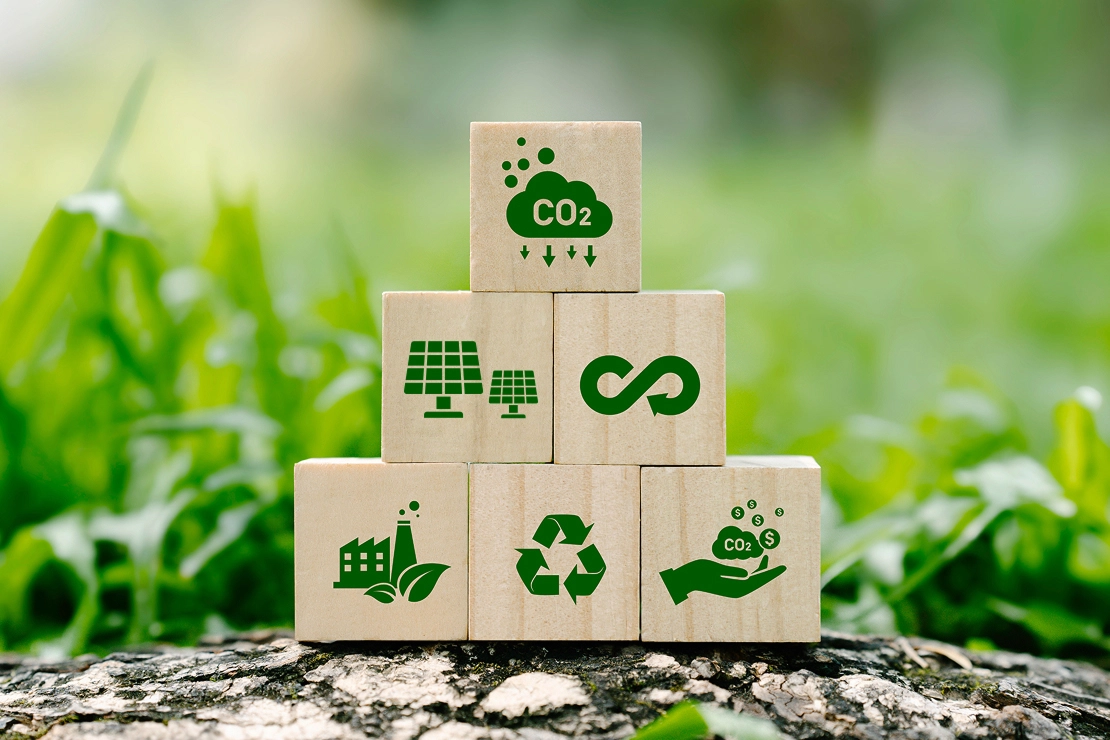

Environmental Policy
Commitment, Challenge and Opportunity
As a leading company in the construction industry, CH. Karnchang recognizes the potential environmental impacts on all stakeholders. Therefore, the company has developed strategic plans and goals to systematically manage natural resources and environmental sustainability.
CH. Karnchang recognizes the growing environmental challenges and the far-reaching impacts of climate change on ecosystems, the economy, and overall societal well-being. The company acknowledges that its own business operations—such as natural resource consumption, greenhouse gas emissions, and construction waste—also contribute to these challenges. These environmental shifts bring significant risks, including an increase in natural disasters, resource scarcity, and infrastructure instability. Additionally, businesses face mounting pressure due to stricter environmental regulations, rising operational costs, and increasing expectations from consumers and investors for sustainable business practices. However, proactive environmental and climate change management also presents valuable opportunities for long-term business growth. These include driving innovation in green technologies to enhance efficiency and reduce costs, accessing green financing and government incentives, expanding into environmentally conscious markets, and strengthening corporate reputation and stakeholder trust.
To address these challenges, CH. Karnchang is committed to advancing its policies on environmental management, green construction, climate action, and sustainable biodiversity while strengthening stakeholder confidence. The company emphasizes environmentally responsible construction by utilizing high-quality materials that minimize ecological impact, implementing effective environmental and climate change management strategies, and optimizing water, energy, and natural resource usage. Additionally, efforts include reducing pollution, conserving biodiversity, and fostering green innovation across all aspects of operations—spanning production, business processes, and partnerships throughout the value chain. These initiatives align with the company’s 2023 Code of Business Conduct and Best Practices, as well as its policies on environmental management, green construction, climate action, and sustainable biodiversity. As of 2024, no revisions or updates have been made to these policies.
Supporting the SDGs Goals
Goal 7:
Goal 8:
Goal 12:
Goal 13:
Goal 15:

Stakeholders Directly Impacted
Goals and Performance Highlights
- Energy Management
- Climate Change Adaptation
- Water Resource Management
- Waste Management, Construction Material Quality, and Biodiversity Conservation
- Air Quality Control

Management and Operational Approach
Water Resource Management

CH. Karnchang is committed to enhancing operational efficiency to minimize water-related impacts. The company has implemented both quantitative and qualitative control measures
by reducing water consumption and integrating water recycling systems within its projects. Particular emphasis is placed on projects located in water-stressed areas. Furthermore, this water management strategy is interconnected with air quality control efforts, as recycled water is utilized for spraying to mitigate dust in construction zones.
Air Quality and Noise Management

CH. Karnchang is committed to enhancing operational efficiency to minimize its impact on air quality. While noise pollution is an unavoidable aspect of construction, excessive noise levels can significantly disrupt the daily lives of nearby residents.
To address this, CH. Karnchang has implemented control measures to mitigate noise impacts, ensuring compliance with the standards set by the Notification of the National Environmental Board No. 15 (B.E. 2540). The regulatory noise limits specify that the maximum permissible noise level must not exceed 115 A-weighted decibels (dBA), and the 24-hour average noise level must remain below 70 dBA. In 2024, CH. Karnchang actively monitored and assessed noise levels across its construction projects. The results confirmed full compliance with regulatory standards, with no complaints recorded regarding excessive noise. To further minimize noise-related disruptions, CH. Karnchang has established the following measures:
Measures to mitigate noise impact
- Restricting loud construction activities to between 06:00 and 22:00. If work extends beyond these hours, advance notifications will be provided to nearby communities.
- Implementing noise control measures, including the installation of temporary noise barriers around construction zones.
- Ensuring solid fencing (at least 2.0 meters high) is erected around excavation sites, demolition areas, drilling operations, and concrete mixing zones.
- Deploying noise monitoring devices at construction sites to ensure compliance with regulatory limits.
Waste Management, Construction Materials, and Biodiversity

The company considers waste management a key priority, emphasizing proactive measures at the source. This includes efficient material planning, optimizing construction material usage, and reusing materials whenever possible without compromising safety.
The company also promotes sustainable building design and construction, including the use and production of energy-efficient materials that reduce greenhouse gas emissions and undergo Life Cycle Assessment (LCA) evaluations. Additionally, the company avoids construction materials that may emit volatile gases or hazardous substances, such as asbestos. Furthermore, the company is committed to biodiversity conservation and collaborates with external organizations to support conservation efforts, particularly in ecologically sensitive areas. For example, special measures are taken to protect aquatic species in construction projects located near major water sources, such as the Mekong River.
Energy Management and Climate Change

CH. Karnchang conducts climate risk assessments to evaluate the potential risks and impacts of climate change on its business operations and stakeholders. The company also implements energy management strategies across its projects and operational sites, including its headquarters.
A key focus is fostering a culture of environmental responsibility among employees and stakeholders by promoting energy conservation and increasing awareness of climate adaptation measures. In line with global sustainability efforts, CH. Karnchang is committed to achieving net-zero greenhouse gas emissions by 2065, aligning with the goals of the Paris Agreement. To achieve this, the company prioritizes the adoption of renewable energy, optimization of operational efficiency to reduce costs, strict compliance with environmental regulations, and active engagement of employees and stakeholders in environmental initiatives.
As part of its sustainability strategy, CH. Karnchang has installed solar energy systems to increase its use of clean energy and has plans to expand their implementation further. Additionally, the company has conducted a comprehensive greenhouse gas emissions assessment covering : Scope 1: Direct emissions from business operations, Scope 2: Indirect emissions from purchased energy, Scope 3: Indirect emissions from other business-related activities. These insights inform the company’s strategic planning for reducing emissions and enhancing environmental sustainability for the broader community.
Environmental Awareness

CH. Karnchang is dedicated to upholding ethical business practices and good governance, ensuring corporate growth while safeguarding natural resources and enhancing community well-being. The company strives to foster long-term positive impacts on the environment, economy, and society. A key focus is raising awareness and strengthening environmental management capabilities among employees. To achieve this, CH. Karnchang continuously organizes activities, training programs, and educational initiatives to equip employees and contractors with the knowledge and skills necessary for effective environmental management.
All environmental initiatives undertaken by CH. Karnchang undergo rigorous environmental impact assessments, with continuous monitoring and evaluation. These measures drive ongoing improvements in environmental management efficiency, demonstrating the company’s unwavering commitment to integrating sustainability into its business operations.
